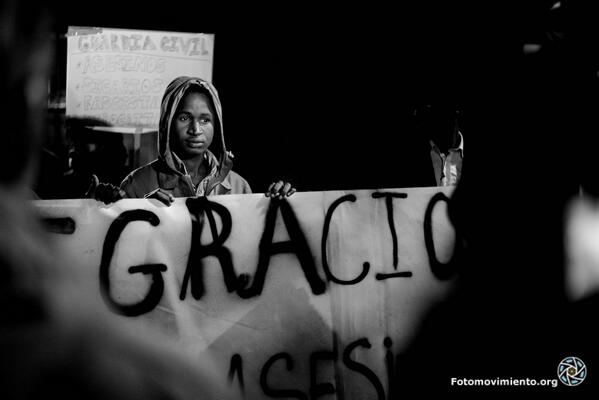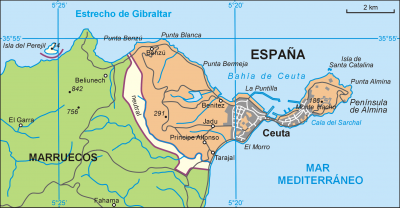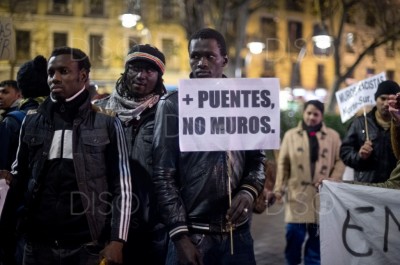
Image from Fotomovimiento taken at the Barcelona protest. Used under CC License.
Fourteen people from sub-Saharan Africa died, as a group of 200 people tried to enter Spain from Morocco by swimming around the fence in port city Ceuta's waters.
Immigrant and civil society organisations accuse the Guardia Civil (Civil Guard) of negligence. They say the Civil Guard did not assist [es] the stranded immigrants and did not alert the coastguard to rescue them. They also condemn the use of rubber bullets and tear gas against the immigrants which were used to prevent them from crossing the border.
The Guardia Civil has denied the accusations and created confusion by constantly changing their version [es] of the events of Thursday, February 6.

Map of the border zone between Morocco and Spain – Wikipedia
A week after the tragedy, protests were convened in 15 Spanish cities to condemn the death of the immigrants’. At a citizen gathering in Madrid, the most popular slogans [es] were: “They didn't drown, they were murdered”, “Natives or foreigners, we're all the same working class”, “No one is illegal” and “Where are the pro-lifers now?”, the latter in reference to those who support the controversial reform of the Abortion Law that the Spanish conservative government is currently preparing.
The Spanish Interior Minister Jorge Fernández Díaz finally acknowledged the use of riot gear by the security forces, although he claimed that it was used “only as a deterrent” to prevent the migrants from crossing the border. While the minister was appearing in the House of Representatives and facing the questions and accusations of the opposition parties, Twitter was transformed into a vehicle for people to express their indignation via the now trending topic #muertesCeuta [#Ceutadeaths]:
Parece q para hacer prospecciones petrolíferas las fronteras son más anchas que para salvar vidas #muertesceuta
— Leire Iglesias (@leireis) febrero 13, 2014
It seems that when prospecting for oil the borders are a lot wider than when for saving lives #muertesceuta
— Leire Iglesias (@leireis) February 13th, 2014
El ministro reconoce que se utilizaron las pelotas de goma pero no sobre las personas… a qué disparaban? a las gaviotas? #muertesCeuta
— Lorena Sainero (@Anerol27) febrero 13, 2014
The minister acknowledges that rubber bullets were fired but not at people… what were they firing at then, the seagulls? #muertesCeuta
— Lorena Sainero (@Anerol27) February 13th, 2014
Hay cosas que no debemos permitir jamás. #muertesCeuta
— Ani ツ (@Vaquesinmas) febrero 13, 2014
There are some things which we should never allow to happen. #muertesCeuta
— Ani ツ (@Vaquesinmas) February 13th, 2014
Disparar al agua cerca de gente que no sabe nadar y está desesperada no es disuadir “por razones humanitarias”, es otra cosa #muertesCeuta
— Juan Luis Sánchez (@juanlusanchez) febrero 13, 2014
Shooting into the water near people who are desperate and can't swim isn't deterring them “for humanitarian reasons”, it's something entirely different #muertesCeuta
— Juan Luis Sánchez (@juanlusanchez) February 13th, 2014
There are still many questions to be answered:

Photo by Dani Gago – DISO Press. ‘More bridges, no walls’
What is the existing protocol for managing the entry of immigrants in Spain? Did the Guardia Civil's actions in Ceuta show respect for the law and the immigrants’ human rights? Were some of the immigrants who did manage to reach Spanish territory returned to Morocco, in spite of the illegality of such an action?
One Twitter user briefly summarises the need for accountability:
¿Por qué el ministro tiene que dar respuestas a las incógnitas que rodean a las #muertesCeuta? Sobre todo, por ellos: http://t.co/TzhPH6zS9M
— Gabriela Sánchez (@Gabriela_Schz) febrero 13, 2014
Why should the minister provide answers to the mysteries surrounding the #Ceutadeaths? Above all, for them: http://t.co/TzhPH6zS9M
— Gabriela Sánchez (@Gabriela_Schz) February 13th, 2014







3 comments